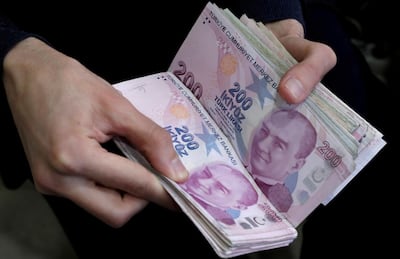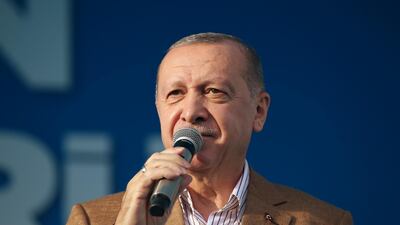On a visit to Turkey’s eastern city of Malatya at the weekend, President Recep Tayyip Erdogan came face to face with the stark financial hardships facing many as coronavirus and high inflation ravage the economy.
“We’re unemployed. We can’t take bread home,” one member of the crowd in front of the president’s coach shouted.
Mr Erdogan responded that the man’s plea seemed “too exaggerated” as he tossed bags of tea into the crowd.
Although the man, head of Malatya’s chamber of minibus drivers and public servants, later claimed his words had been “distorted” in the media, the videoed exchange touched a nerve with many Turks facing a daily fight to provide for themselves and their families.
Hacer Foggo, the founder of the Deep Poverty Network that has distributed food to thousands of families in Istanbul since the start of the pandemic, said many people dependent on casual work were facing desperate conditions.
"We continue to send food to families during the pandemic," she told The National. "These families now have difficulty accessing food.
“Many of them cannot pay their rent, bills are piled up and the electricity is out. In addition, many children have difficulty in accessing distance education because there is no internet at home.”

A recent report from two traders’ unions claimed that more than 40 per cent of Turks – 34 million in a population of 83 million – are below the poverty line or survive close to it.
Turkey’s economy has been on a downward trend since before a 2018 currency crisis.
On Monday, the lira dipped below eight to the US dollar, the latest record low in a decline that has seen the currency lose a quarter of its value since January.
Although Berat Albayrak, Mr Erdogan’s finance minister and son-in-law, has tried to downplay the significance of the collapse, the falling lira has placed added pressure on an inflation rate that stands at 11.75 per cent annually.
This has raised prices for essentials such as energy and fuel, for which Turkey is largely dependent on imports.
Unemployment remains in double digits, with the latest figures showing 13.4 per cent of workers jobless. Youth unemployment stands at 25.9 per cent.
“Both the health and economic side are really putting a lot of pressure on individuals,” said Can Selcuki, general manager of Istanbul Economics Research.
“We had a break over summer in terms of economic activity but it seems like the prospects are turning negative and the sentiment among the public is worsening.
“This is hard as it is but it’s much worse when it’s over a prolonged period of time and it’s becoming very challenging for average households.”
Although the economic data presents a dire picture for Turkey, many believe it is worse than the official figures suggest.
Last week the independent Inflation Research Group reported that September’s real inflation rate was four times higher than government statistics.
“The inflation rate doesn’t satisfy anyone because many people don’t believe the official figures while unemployment is measured in a very narrow way,” economist and writer Mustafa Sonmez said.
“Many people are experiencing serious problems like unemployment but they are too afraid to speak out or protest. Fear is dominant in society and people feel they can’t express themselves.”
Meanwhile, critics say the government has adopted diversionary tactics, highlighting rows such as the one with French President Emmanuel Macron over European attitudes to Islam or heralding "wins" such as the reopening of Istanbul's Hagia Sophia as a mosque in July.
“The situation is getting worse and worse and Erdogan isn’t doing anything economically,” Mr Sonmez said. “So, they try to change the agenda, mainly through foreign affairs such as the French issue or through religious or nationalist issues, to consolidate their base.”
Mr Erdogan’s party has held power in Turkey for 18 years largely through the votes of poorer sections of Turkish society but the economic crisis is threatening to erode that support.
In a sign of rising desperation, newspapers have reported a surge in suicides due to financial hardship.
A month before coronavirus hit Turkey, a painter in the southern province of Hatay set himself alight in front of the governor’s office after complaining of being jobless.
“My children are hungry, I want work. Don’t you understand?” Adem Yarici, 42, pleaded before dousing himself in petrol and sparking his cigarette lighter.



















